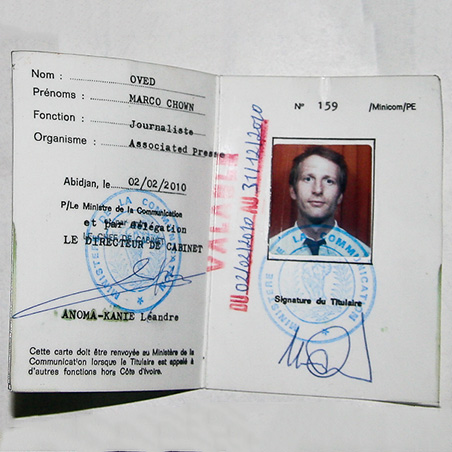Marco Chown Oved
Investigative Reporter for Toronto Star
Bachelor of Arts (Hons), Contemporary Studies and History, 2005
I found myself in the middle of a small-scale civil war when an election went sideways.
“I’m a little like Forrest Gump,” Marco Chown Oved says with a laugh.
He has a point. Marco found himself, again and again, witness to major events. But not just a witness. He has made a career out of documenting them.
When Marco graduated from King’s Contemporary Studies Program (CSP) he wasn’t sure what he wanted to do. A professor mentioned a program he could apply for–teaching English in France’s public-school system. It would be a chance to learn another language. He got the job – in the Paris suburbs known as the banlieues. It would be his first Gumpian moment.
“Three weeks after I arrived the giant riots started,” Marco recalls. French youth from the poorer neighbourhoods were protesting unemployment and police harassment. “They burned cars and buildings. One day I arrived at my school and it was completely burned out. I was super angry because no one had called to tell me not to bother coming in!” Marco finishes with a laugh.
He had done a little writing at King’s for The Watch and thought he might try his hand at reporting what he was seeing.
“That was my instinct. Sitting there in the middle of a story that was going around the world. I wrote my first few articles and they were published in an alternative newspaper in Canada.”
Marco continued to teach and improve his French. He entered a Masters program at the Sorbonne as a way to stay in France. Then one day he met Matt Yanschysyn (2002) a King’s alumnus. Matt worked for the Associated Press (AP) and told Marco they were looking for an intern. Marco applied. That was during the presidential election campaign.
“Within my first week I was interviewing Nicolas Sarkozy.”
Marco says he knew he was hooked on “the coolest job ever”. He left AP and worked with various media outlets before joining Radio France International. From there he set sail for the Ivory Coast. He wanted to be a reporter on the ground, to learn about “people and cultures and new ways of doing things”.
Ivory Coast was peaceful at first. Then, he says, “I found myself in the middle of a small-scale civil war when an election went sideways, and both candidates declared victory. That was my first taste of conflict journalism. I didn’t like it. You can’t do much when the bullets are flying. You stay inside and call people. I was stuck in a hotel for two weeks, filing stories every day, but I thought this is not for me.”
Marco returned to Canada and landed an internship with the Toronto Star. The first years were on the City Desk covering stories like the giant squash, the raccoon up a tree and “a car chase with former mayor Rob Ford”. It all paved the way for a move to the Foreign Desk and then into the Investigative Unit covering major stories such as the Panama Papers.
“I feel fortunate to be an investigative reporter these days. There is no money in media, no one takes time to do it right. Yet I am given months and months with free rein to do really challenging and impactful projects.”
Marco figures King’s gave him what he needed to follow his path.
“I was treated like an adult from the first day at King’s—like I could handle any intellectual challenge. That gave me the confidence to plunge into unknown countries and subjects knowing I’d be able to handle it.”
Not quite Gumpian in the end, but riots, civil war, presidents and corruption do make for a good story.
Posted: January 2019
